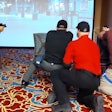The Star of Reno shines no more. Luck ran out a long time ago for those who lodge at the Roulette Motel. And you'll find more grim than glamour at the Monte Carlo.
Welcome to downtown Reno, Nev., where once-tony tourist motor courts have declined into low-budget, high-crime economy motels and turned the city center into a modern-day haven for drug dealers, prostitutes, convicted felons, and addicts of every stripe.
Fortunately, it is also the turf of Reno Police Department's Motel Interdiction Team, a law enforcement, crime prevention, and services-outreach team targeting budget motels in the downtown area. With it, police in The Biggest Little City in the World are reclaiming properties and driving out criminals and other social predators who live there.
"One bad motel affects the entire city block, and in less than a two-square-mile radius, we have 50," says Sgt. Greg Ballew, who supervises the department's Downtown Enforcement Team. "We knew that we could impact crime in all our downtown area, just by controlling the motels."
Long before Las Vegas became the international gaming and risqué-entertainment playground it is today, Reno was a gambling mecca. Sin City's growth led to Reno's decline, and its downtown suffered an additional blow in the 1990s when big-name resort-hotel-casinos lured even more tourists away from its modest "motor hotels."
Occupancy plummeted. Room rates fell to as low as $19 per night (or $120 weekly) and the aging motels quickly became squalid lodging for the working poor. They also attracted local and out-of-town undesirables in search of fast, anonymous room rental: Unlike apartment complexes, low-budget motels don't require first and last months' deposits, credit checks, background checks, or even-at least, until recently-proper identification.
A lot of motel dwellers are "between having an apartment, and being on the street," Ballew says. "Low-budget hotels have become the home of sexual predators, criminals, drug dealers, drug addicts, ex-felons, and alcoholics."
Reno Police Department's Motel Interdiction Team is comprised of police officers Tim Mayes and Kevin Barnes, and focuses on budget motels with 20 to 40 rooms. Working closely with government agencies, charitable groups, and other law enforcement agencies, the team takes note of residents who need help-and takes down those who break the law.
For their first project, team members chose the Lido Inn, an especially notorious property, even within Reno's crime-ridden motel subculture. Nine of its 22 units were operational drug rooms, protected by armed lookouts. Three rooms were used for prostitution. The rest were infested with addicts. The criminal element at the Lido controlled a four-block radius downtown, turning the motel into a surreal world where open drug dealing, room-invasion robberies, and parking-lot shootouts were commonplace.
The Lido Inn alone caused a severe drain on officer resources, generating more than 70 calls for service each month. All 52 downtown economy hotels-some of which were so dangerous that a minimum two-unit response was required-consumed tens of thousands of officer hours annually.
"We were answering hundreds of calls at these low-budget hotels each month. All of patrol was," says Officer Tim Mayes, an 18-year department veteran. "We realized we could keep doing that forever, putting out all these little fires, but we weren't fixing the overall problem."
Following a two-week surveillance of the property, police hit the Lido with waves of search warrants, and immediately arrested more than 25 residents for felony-related crimes. Officers contacted the local property owner, who immediately fired the on-site managers after being informed that they were drug addicts who traded rooms in exchange for narcotics.
Reno police created a safer, more controlled environment at the motel through environmental design, which included the installation of strategically placed fencing, creation of a keyed-access elevator, and removal of overgrown bushes that hid prostitution activity-all at the cost of the motel owner. Motel room registration practices were changed, requiring photo identification and warrants checks and the posting of signs that read "This Motel works with the Motel Interdiction Team and you may be checked for warrants."
After two months, calls for service at the motel dropped to about three per month. Most impressive is that two years later, the Lido maintains its clean reputation-and the owner was even able to raise room rates from $19 per night to $29 per night.
"The biggest surprise is how one motel cleans up the entire area that surrounds it," says Ballew, who has been with Reno Police Department since 1988. "When you take away the drug dealers and prostitution, you take away all the petty criminals, and it cleans up the area."
As police take control of downtown Reno, it has enabled other city agencies to fulfill their mandates: condemning unsafe properties, verifying that utilities and appliances are in good working order, and holding owners responsible for pest and mold control, plumbing repairs, and other management issues.
"So many people are excited to be working with us," Mayes says. "You talked to fire inspectors, and they said they don't go there because they don't feel safe. Health inspectors and code compliance say the same thing."
Key to the team's success has been development of liaisons within many partner organizations. Officers were even able to get one deputy district attorney assigned to assist in prosecuting offenders who used motels.
"Until we integrate into our community in a coordinated effort with all available resources, we cannot effectively assist each element of our society," says Officer Kevin Barnes, a 13-year department veteran and co-founder of the Motel Interdiction Team.
Police also empowered motel owners and managers by teaching them to recognize behaviors associated with narcotics and prostitution activity. Officers also advised them of Reno's nuisance-abatement law, which enables the city to evict residents from problem properties, temporarily close the motel, or even seize the property.
The education campaign got owners' attention. Despite low rents, budget motels can generate high returns. And closure of a large daily motel could result in the loss of a potential rental income of $80,000 monthly.
Police were also assisted by municipal codes that made it illegal to register in a motel under a false name, and enabled police to inspect registration books upon request. Some managers now send a daily e-mail listing renters' names to police, who run the names and serve warrants. Openly shared motel registration information has also helped police locate runaways and unregistered sex offenders.
While the Motel Interdiction Team focuses on fighting bad guys, officers also get to help good people caught in the nightmare world of low-budget motel dwelling. The team works with military recruiters and faith-based groups, as well as organizations like the Northern Nevada Food Bank, and Family Promise of Reno. The latter provides specially selected families with food and short-term subsidized housing, enabling them to save 80 percent of their paycheck for a conventional apartment.
"I'm truly blessed to work this assignment," Mayes says. "It's different, and there's such a variety, but I haven't given up any law enforcement. I get a chance to work plainclothes, surveillance, in uniform, sometimes in the office in meetings, and some days out on the streets. Turning a place around is very rewarding."
Bryn Bailer, a former newspaper reporter, is a contributing editor for POLICE. By night, she is a member of the Tucson (Ariz.) Police Department Communications Division.
AGENCY SNAPSHOT
Reno Police Department
Reno, Nevada
Chief: Michael Poehlman
Number of sworn officers: 346
Population served: About 200,000
Service area: 101 square miles
Calls for service (2005): 498,000
Pay scale:
Starting pay (annual): Recruitment currently closed
Lateral transfer: Recruitment currently closed
Retirement: Fully vested at five years
Uniform allowance (annually): $1,200
Average temp. Feb.: 25/52
Average temp. Aug.: 50/90
Annual precipitation: 7.5 inches
Patrol: Single
Patrol cars: Ford Crown Victoria
Service weapons (issued): Varies















